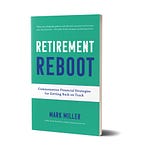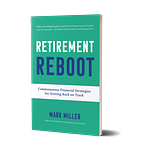
This week on the podcast, we update some important developments out of Washington related to retirement that occurred just before the holidays.
Congress wrapped up the year passing a massive $1.4 trillion omnibus spending bill. Usually with legislation like this, a lot of unrelated legislation gets tacked on and moved through, and this was no exception.
One important piece of legislation was included in the bill - and another was not.
The bill that did pass is called the SECURE Act. It’s a grab-bag of retirement policy ideas that have been bouncing around Washington for a number of years. But it is important because it’s the only piece of significant retirement legislation to be passed in Washington since 2006, when the Pension Protection Act was signed into law. Laws like this really do make a difference over time. The PPA ushered in some major positive changes like the widespread adoption of target date funds and automatic enrollment of new workers in retirement plans.
My guest on the podcast this week will talk with us about what’s good about this bill from a financial services industry perspective. Melissa Kahn is managing director of retirement policy for the defined contribution team at State Street Global Advisors. She is an attorney with extensive experience in the world of employee benefits and regulation. Before joining State Street, she worked as a consultant in the industry and also for more than a decade working in the life insurance business. So she is going to give us a good idea of the arguments the industry has mounted in favor of this bill.
There really are two keys things to know about this law. First, it clears the way for a new type of 401k plan aimed at making it easier for small employers to offer retirement plans to workers. They are called open multiple employer plans - or MEPs for short. Small businesses are the least likely to offer plans, so the idea here is that small employers can join plans that would be offered by private plan custodians, like a Fidelity, Vanguard or Schwab. The hope is that small businesses will be enticed by low costs and streamlined paperwork, and an increased tax credit to cover their setup costs. The jury is out on whether that will really happen. I’ve written a number of stories on open MEPs over the last year or two and will include links to them in the subscriber edition of the newsletter this week.
Second, the SECURE Act contains a provision that makes it easier for 401k plans to offer annuities. It creates a so-called “safe harbor” that protects plan sponsors from legal liability if anything goes wrong with the insurance company offering the annuity. Instead, it relies on state insurance regulators to certify the safety of the annuity provider.
This is really where the SECURE ACT got its push - the insurance lobby has been salivating over this for years and wanted to see it get done.
Don’t get me wrong - a serious case can be made for some people to use annuities in retirement. But they’re not right for everyone. One worry here is whether there will be enough education for 401k participants on annuities, when to use them and how. Another major concern: what type of annuities will be offered? Consumer advocates urged Congress to limit the safe harbor in SECURE to cover only simple income annuities. They argued against including things like fixed-index and variable annuities are too complex and confusing for regulators to police, and for participants to understand. They lost on that point.
I do think we’re going to see a big push by the companies that administer plans to get annuities into workplace plans. Employers probably will take a conservative approach to it. But we’re already starting to see new products start to take shape, like target date funds with annuities built in. Expect to see more of that.
The SECURE Act also includes a couple other significant changes. It boosts the age when you need to start taking required minimum distributions from tax deferred accounts from 70 and a half to 72 and a half. And it phases out the use of stretch, or inherited IRAs. That last one has important implications for people with large tax-deferred accounts who hope to pass those assets on to heirs. (I’m working on a separate story about that which will be published soon.)
The second thing I wanted to mention about the omnibus spending bill is something that didn’t make it into the legislation. That is a fix for the looming meltdown in multiemployer pensions. Don’t confuse this with the multiple employer plans I just mentioned. This is very different. These are traditional pension plans created under collective bargaining agreements by groups of employers in industries like construction, trucking, mining and food retailing.
More than 100 multiemployer plans covering 1.4 million workers and retirees are underfunded and sponsors have told regulators and participants that they could fail within the next 20 years. The problem is worsening, but Democrats and Republicans in Congress haven’t been able to come up with a plan they can agree on. House Democrats passed a plan last July built around providing low-interest loans to struggling plans. But the Senate has a very different plan. It increases the insurance premiums that plan sponsors pay into the system, and adds new premiums that would be paid by retirees as well, which would effectively act as a benefit cut. It also contains reforms to the discount rate assumptions plans use to project the future health of plans.
So Congress is stuck, and by one analysis 44 plans will fail by 2025. They did manage to come up with a bailout for one fund that is on track to fail by 2022 - which is sponsored by the United Mine Workers of America plan. Having a powerful friend like Senate Majority Leader Mitch McConnell - from a big coal producing state - didn’t hurt in getting that done.
To hear my interview with Melissa Kahn, click the player icon at the top of the page. One word about this - we taped this discussion just before the holidays, as the Secure Act was headed for passage, so you’ll hear some discussion along that line at the start of our conversation.
Subscribe now!
This is a listener-supported project, so please consider subscribing.
The podcast is part of the subscription RetirementRevised newsletter. Subscribers have access to all the podcasts, plus my series of retirement guides on key challenges in retirement. Each guide is paired with a podcast interview with an expert on the topic; the series already covers Social Security claiming and the transition to Medicare, and how to hire a financial planner. The most recent looks at the critical decision between Original Medicare and Medicare Advantage.
Readers also get my weekly summary and analysis of key developments in retirement. This week, it includes analysis of the latest polling of voters on Medicare for All, why we’re headed for a severe shortage of geriatricians to care for the elderly and an ill-advised plan to let ordinary retirement savers invest in risky private equity deals.
You can subscribe by clicking the little green “subscribe now” link at the bottom of this page, or by visiting RetirementRevised.com. And if you’re listening on Apple Podcasts, Spotify or Stitcher, I hope you’ll leave a review and comment to let me know what you think.












